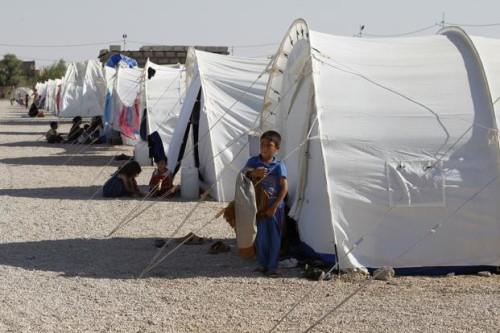How NGOs access ISIS territory to deliver help
When I was in Erbil, less than a month ago, I sat down in a cafe and started chatting with an old friend. She has been an aid worker for years — for obvious security reasons I will not use her name, so let’s call her Alex — and she recently moved to Iraqi Kurdistan. Alex filled me in with details about her life and work.
Then she started telling me a story and at first I thought she must have been mistaken.
“The other day I was in a meeting with other NGOs and they started talking about a refugee camp in Anbar which is still running under ISIS,” she said realizing she triggered my reporter interest.
“What do you mean?” I asked her innocently since I was convinced refugees and IDPs — internally displaced people — were able to flee the area before ISIS seized it.
“I would say everybody who operates in the area knows about Al Qaim, but they try not to publicize it too much. There are many risks involved, especially for the people who work on the ground.”
But the reality, I discovered while reporting for Reuters Foundation on this topic, is that International organizations also do not want to be liable under counter-terrorism laws. As experts explained to me the lines are blurry and there is a great tension with international humanitarian laws. So they rather not speak about what they do and especially how in certain areas. It is true for Iraq, Afghanistan, Somalia and all the places where there is a non-state actor on the scene.
The reality is that NGOs and aid-organizations have to engage conversations and in most of the cases negotiations with terrorists labeled groups in order to support civilians in a conflict, especially those who are trapped in areas.
Is it right?
Opinions might vary on this, it really depends on who you are talking to. An aid-worker might argue that it’s the organization responsibility to actually reach people in need. On the other hand a soldier would disagree, insisting that negotiating with a terrorist group it’s dangerous, and if the organization is providing help that is actual illegal.
The point here is nobody would come on the record and admit they negotiated with terrorists, also because they might loose all the fundings. I really don’t see banks or trust giving money to organizations who negotiate with terrorists. And this is the reason why so many organizations — including UNICEF and International Rescue Committee — refused to provide any details about what they were doing in Al Qaim.
But others actually did talk to me about it.
The camp received aids in black bags with no International logos, until February 2015. Now it’s almost impossible to reach the camp, which is at the Iraqi-Syrian border, and medical supplies arrive in the camp twice a year. The transportation truck — the journey cost as much as $6,000 — has to literally bribe its way into ISIS territory passing first Iraqi Army checkpoints and then terrorists roadblocks. And once it gets to the area supplies have to pass in hands in order not to raise too many questions.
Al Qaim is the only UN refugee camp in Iraq still functioning under ISIS.
Do you think the camp should be shut down?
